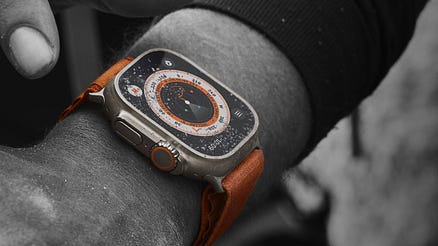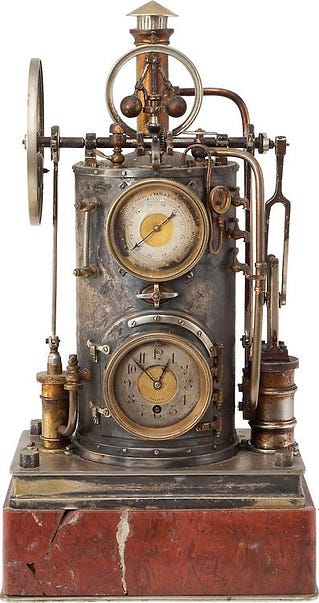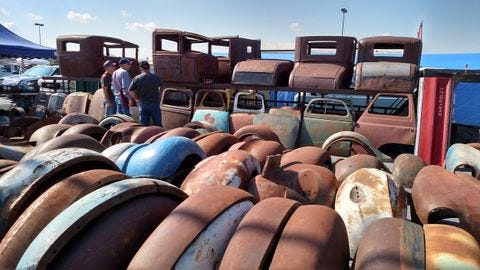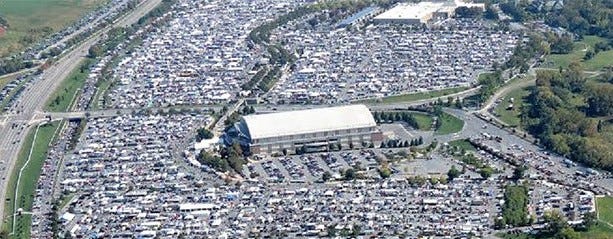Feake Hills, Crooked Waters - Autumn, clocks, and chocolate
Do you own any artificial things that are so well designed and satisfying to use that you’d happily keep them for your whole life? If you do, chances are they are already old. Newly made things are not intended to last for long, even though some of them really are satisfying and well designed. I’m using an iPad right now; I think that qualifies. So have a few other computers I’ve used over the years. But none of those other computers even work any more — or if they do, it would take an increasing amount of effort and expertise to keep them working. A few people still use computers from decades ago, but my impression is that they spend more time keeping the things working than actually using them. No matter how much you enjoy your Apple Watch, your laptop computer, your Tesla, your microwave oven, your laser printer, you won’t be able to use them for long. They’re intended not to last, for reasons that have nothing to do with you or your interests. New tools and artifacts only partly exist to be satisfying or useful. The main reason they exist is to fuel the growth of, in Lewis Mumford’s words, “megamachines,” and the hoarding of value in terms of “money.” Mumford noted “Without constant enticement by advertising, production would slow down and level off to normal replacement demand. …many products could reach a plateau of efficient design which would call for only minimal changes from year to year." What’s a “megamachine?” It’s not a big metal thing with lots of gears and pushrods; it’s an organization. A highly complex organization; its components are humans. A big commercial company is a megamachine. One of the most well-known and successful ones is Apple. Many of their products are physically as close to perfect as they can design and build them. An Apple Watch is probably at least as durable as an expensive Swiss watch that might be passed down for generations. But nobody’s going to be passing down any Apple watches. They’ve only existed since 2015 — just seven years — but already many of the “older” ones are now useless. Not because of any flaw in the hardware, but because the megamachine that created them makes no money supporting the software after whatever minimal interval they choose, and makes plenty of money selling a new version of the same device. An Apple Watch is many things, but it gets its name from a pretty basic function: it’s a clock. Returning to Mumford for a moment, he thought the most important and fundamental machine was the clock. It’s the thing that’s the most important basis for the development of capitalism because time thereby becomes abstracted; a commodity. Something that can be traded, as in swapping hours of your presence, attention, and effort for another abstract commodity: money. You need money, of course, because another megamachine, a government, demands that its taxes be paid in that form. You might be able to create a life-changing masterpiece of art or a simple artifact like a guitar that’s the best in the world, but you can’t pay your taxes with those until you transform them into the abstract value of money. The invention of the clock changed everything, according to Mumford: “When one thinks of the day as an abstract span of time, one does not go to bed with the chickens on a winter’s night: one invents wicks, chimneys, lamps, gaslights, electric lamps, so as to use all the hours belonging to the day. When one thinks of time, not as a sequence of experiences, but as a collection of hours, minutes, and seconds, the habits of adding time and saving time come into existence.” Thanks to the clock, “Abstract time became the new medium of existence. Organic functions themselves were regulated by it: one ate, not upon feeling hungry, but when prompted by the clock: one slept, not when one was tired, but when the clock sanctioned it. A generalized time-consciousness accompanied the wider use of clocks: dissociating time from organic sequences…” (Lewis Mumford, Technics and Civilization, 1937). At this time of year in a long-lost era, we would be transitioning from summer time into autumn time. Nicholas Bate, who writes about the abstract quantity “productivity,” sees Autumn time as having seven aspects: more sleep, more reading, more hiking, more reflection, more soup, more movies, and more night sky. When I was growing up, Autumn also meant “Hershey,” as in Hershey, Pennsylvania. My dad’s hobby was antique cars; preserving them, restoring them, experiencing them, talking about them with other devotees. Antique car fans and collectors have their own clubs and associations that schedule shows and competitions (“meets”). In early October every year there’s a huge meet held in Hershey, Pennsylvania, and my dad and his friends attended nearly every year. It was a long day’s drive from where we lived in Connecticut, and they would plan for the trip for weeks or months, and spend nearly a week there. The antique cars were displayed and judged according to criteria I never really grasped, and possibly even more importantly, metric tons of parts for the same antique cars were trucked and trailered to Hershey where you could buy them in the open-air market that went on for acres and acres. I went too, sometimes, even though at around ten years old I was only mildly interested in either old cars or old car parts. Inexplicably to my dad, I never got more than mildly interested, and never had any wish to participate in any of it by myself. The cars, some of them nearly a century old, could still be driven, at least a little — one of the requirements of having yours in the show was that you drove it into place. Some of them were perfectly usable, and many of the ones from a truly bygone era were designed to be repairable by an expert in a trade that barely exists any more: a blacksmith. Now, we would arguably be in worse shape ecologically and safety-wise if car design had plateaued around 1920, but even though you’d be giving up modern comfort, convenience, and safety, you could conceivably still use one of those machines to do exactly the same thing a new Tesla does: transport you on the road to where you want to go. With reasonable maintenance, assuming the larger infrastructure of fuel and roads continues to exist, you could go on using the old thing practically forever. Certainly many of them have been passed down in families already, sometimes more than once. That’s not going to happen with a Tesla, or any other new car. Mumford had plenty of criticisms of the car, by the way. He classified technologies — which are just a part of “technics” — as either “monotechnic,” which is technology (often, or maybe always, monolithic, without variation) for its own sake, and “polytechnic,” which is a complex set of interrelated technologies. Monotechnic systems tend to oppress humanity and offer only a single alternative. Polytechnic systems help solve human problems by offering many choices. The automobile, particularly in the US, Mumford described as monotechnic. He also foresaw many of the ecological problems we’re now facing. The middle-aged men happily trudging the miles of obsolete car parts and components every autumn in Hershey don’t, I suspect, feel oppressed by the the cars they love and covet and hoard. They gladly travelled to the event, and as far as I could tell from my waist-high vantage point, were having a wonderful time. They acted a bit differently while they were in Hershey. For one thing, nearly all of them seemed to keep snacking on Hershey’s candy — mostly chocolates and peanut-butter cups. Other than that place and time of year, though, I never saw my dad touch one of the things. Hershey’s candy is a mass-produced, manufactured item. I am not a chocolate aficionado, but even I know that a packaged chocolate bar, one of millions of identical items, can’t compare to a confection created by the hands of a craftsperson; a chocolatier. The megamachines and the Eichmanns who keep them functioning (perhaps without fully understanding why) make sure the recipes and packaging and shipping and pricing are the same every time. And the advertising, without which, who knows — maybe the megamachine chocolate would sometimes be openly compared with the eotechnic, or maybe paleotechnic products of craftspeople. We don’t usually do that, you know. Part of it is because the megamachine system has in so many areas of our lives created monotechnic systems where there just is nothing to compare. If you would really prefer a hand-crafted computer or mobile phone, that’s just too bad; there’s no such thing. I think we’ve fallen out of the habit of thinking about such alternatives, even when they exist. After all, you really could dress in clothes that aren’t standardized and mass produced. You really could write using tools from individual makers, although you’d have to make some compromises compared to the cloud-connected screens and keyboards in use now. You could even, just barely, find a means of transport that’s not a monotechnic product only meant to last a little while. We could all do that. But most of us don’t. I wonder if that’s because we understand we could but we’ve decided, in a clear-eyed way, that we don’t want to? Or because we’ve been told not to. In just a couple of weeks some open fields in Hershey, Pennsylvania will be filled with mass-produced parts and components that have aged and fallen out of the mainstream of abstract time, and in the process maybe become something other than what they once were. Everyone searching the piles for that one particular widget or gizmo to fit the 1930 Chevy they love and fuss over will be participating, at least gently, in seasonal time, not clock time. Just like everyone did in a past epoch. Their autumns may not involve more movies or night sky, but they’re definitely hiking through the remnants of the lost past, and reflecting, and if not soup, there is at least, while they’re there, more chocolate. The Lewis Mumford Center at SUNY Albany Lewis Mumford is now a brand of watches, believe it or not. The Antique Automobile Club of America hosts the big show in Hershey every fall. If you liked this issue of Feake Hills, Crooked Waters, please share it! |
Older messages
A Rolling Issue
Saturday, September 17, 2022
Move along, nothing to see here
The Sadistical Issue
Sunday, September 11, 2022
Wait, that's only a 75% match with “statistical”
The falling issue
Tuesday, September 6, 2022
Turning over a new leaf
The Issue with Secrets
Monday, September 5, 2022
Shhh…
The Wandering Issue
Wednesday, August 31, 2022
Hit the road — the road hits back
You Might Also Like
eBook & Paperback • Demystifying Hospice: The Secrets to Navigating End-of-Life Care by Barbara Petersen
Monday, March 3, 2025
Author Spots • Kindle • Paperback Welcome to ContentMo's Book of the Day "Barbara
How Homer Simpson's Comical Gluttony Saved Lives
Monday, March 3, 2025
But not Ozzie Smith's. He's still lost, right?
🧙♂️ Why I Ditched Facebook and Thinkific for Circle (Business Deep Dive)
Monday, March 3, 2025
Plus Chad's $50k WIN ͏ ͏ ͏ ͏ ͏ ͏ ͏ ͏ ͏ ͏ ͏ ͏ ͏ ͏ ͏ ͏ ͏ ͏ ͏ ͏ ͏ ͏ ͏ ͏ ͏ ͏ ͏ ͏ ͏ ͏ ͏ ͏ ͏ ͏ ͏ ͏ ͏ ͏ ͏ ͏ ͏ ͏ ͏ ͏ ͏ ͏ ͏ ͏ ͏ ͏ ͏ ͏ ͏ ͏ ͏ ͏ ͏ ͏ ͏ ͏ ͏ ͏ ͏ ͏ ͏ ͏ ͏ ͏ ͏ ͏ ͏ ͏ ͏ ͏ ͏ ͏ ͏ ͏ ͏ ͏ ͏ ͏ ͏ ͏ ͏ ͏ ͏ ͏
I'd like to buy Stripe shares
Monday, March 3, 2025
Hi all, I'm interested in buying Stripe shares. If you know anyone who's interested in selling I'd love an intro. I'm open to buying direct shares or via an SPV (0/0 structure, no
What GenAI is doing to the Content Quality Bell Curve
Monday, March 3, 2025
Generative AI makes it easy to create mediocre content at scale. That means, most of the web will become mediocre content, and you need to work harder to stand out. ͏ ͏ ͏ ͏ ͏ ͏ ͏ ͏ ͏ ͏ ͏ ͏ ͏ ͏ ͏ ͏ ͏ ͏
mRNA breakthrough for cancer treatment, AI of the week, Commitment
Monday, March 3, 2025
A revolutionary mRNA breakthrough could redefine medicine by making treatments more effective, durable, and precise; AI sees major leaps with emotional speech, video generation, and smarter models; and
• Affordable #KU Kindle Unlimited eBook Promos for Writers •
Monday, March 3, 2025
Affordable KU Book Promos "I'm amazed in this day and age there are still people around who treat you so kindly and go the extra mile when you need assistance. If you have any qualms about
The stuff that matters
Sunday, March 2, 2025
Plus, how to build a content library, get clients from social media, and go viral on Substack. ͏ ͏ ͏ ͏ ͏ ͏ ͏ ͏ ͏ ͏ ͏ ͏ ͏ ͏ ͏ ͏ ͏ ͏ ͏ ͏ ͏ ͏ ͏ ͏ ͏ ͏ ͏ ͏ ͏ ͏ ͏ ͏ ͏ ͏ ͏ ͏ ͏ ͏ ͏ ͏ ͏ ͏ ͏ ͏ ͏ ͏ ͏ ͏ ͏ ͏ ͏ ͏ ͏
Food for Agile Thought #482: No Place to Hide from AI, Cagan’s Vision For Product Teams, Distrust Breeds Distrust
Sunday, March 2, 2025
Also: Product Off-Roadmap; AI for PMs; Why Rewrites Fail; GPT 4.5 ͏ ͏ ͏ ͏ ͏ ͏ ͏ ͏ ͏ ͏ ͏ ͏ ͏ ͏ ͏ ͏ ͏ ͏ ͏ ͏ ͏ ͏ ͏ ͏ ͏ ͏ ͏ ͏ ͏ ͏ ͏ ͏ ͏ ͏ ͏ ͏ ͏ ͏ ͏ ͏ ͏ ͏ ͏ ͏ ͏ ͏ ͏ ͏ ͏ ͏ ͏ ͏ ͏ ͏ ͏ ͏ ͏ ͏ ͏ ͏ ͏ ͏ ͏ ͏ ͏ ͏ ͏ ͏
Pinterest For Authors 📌 30 Days of Book Pins 📌 1 Each Day
Sunday, March 2, 2025
"ContentMo is at the top of my promotions list ... "I'm amazed in this day and age there are still people around who treat you so kindly and go the extra mile when you need assistance. If






